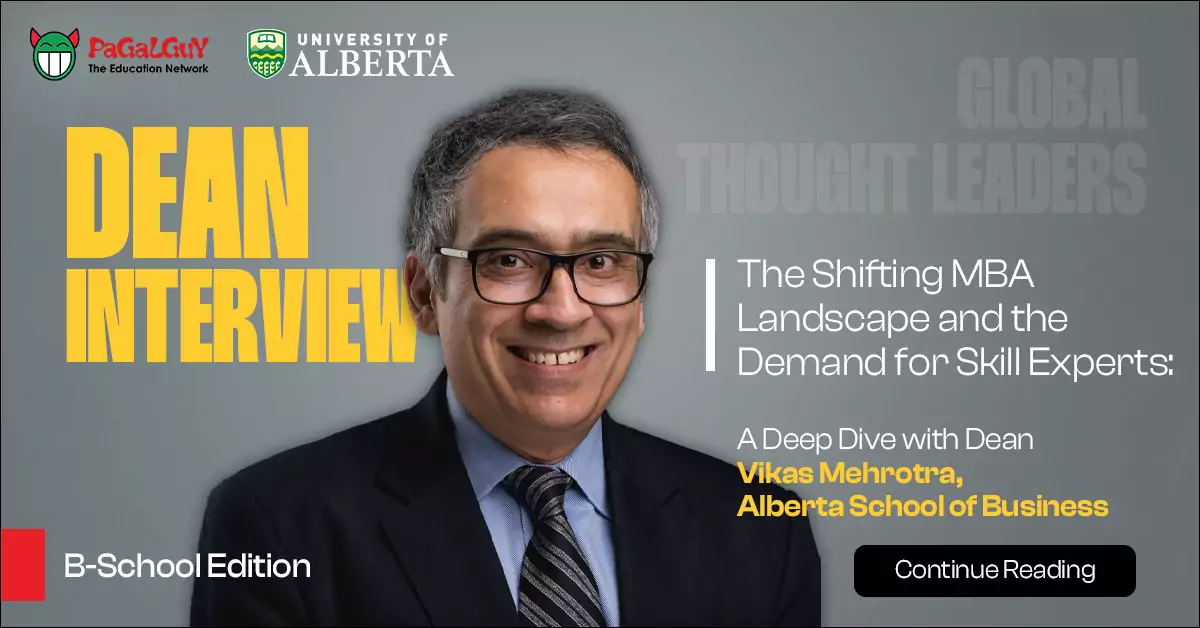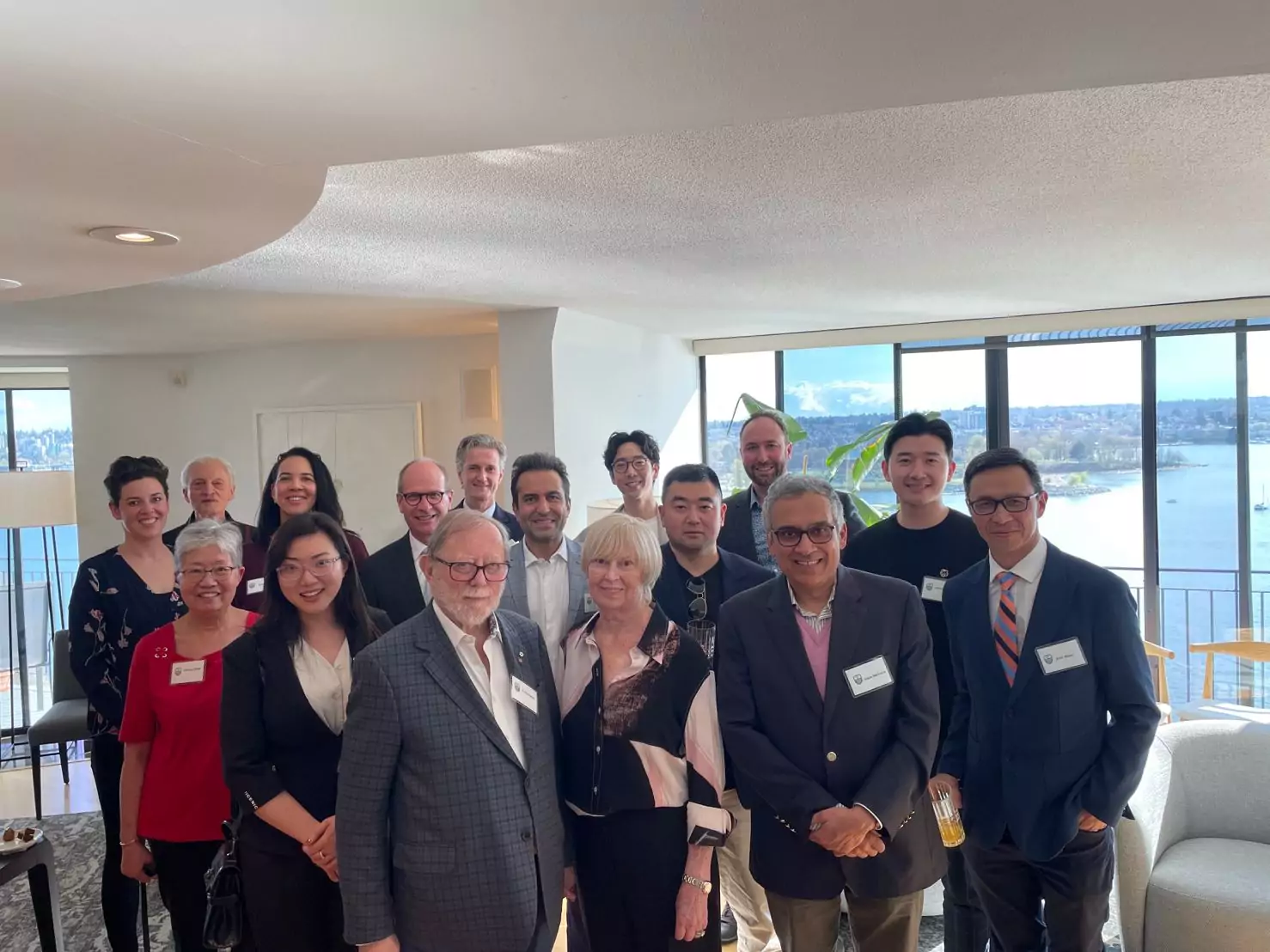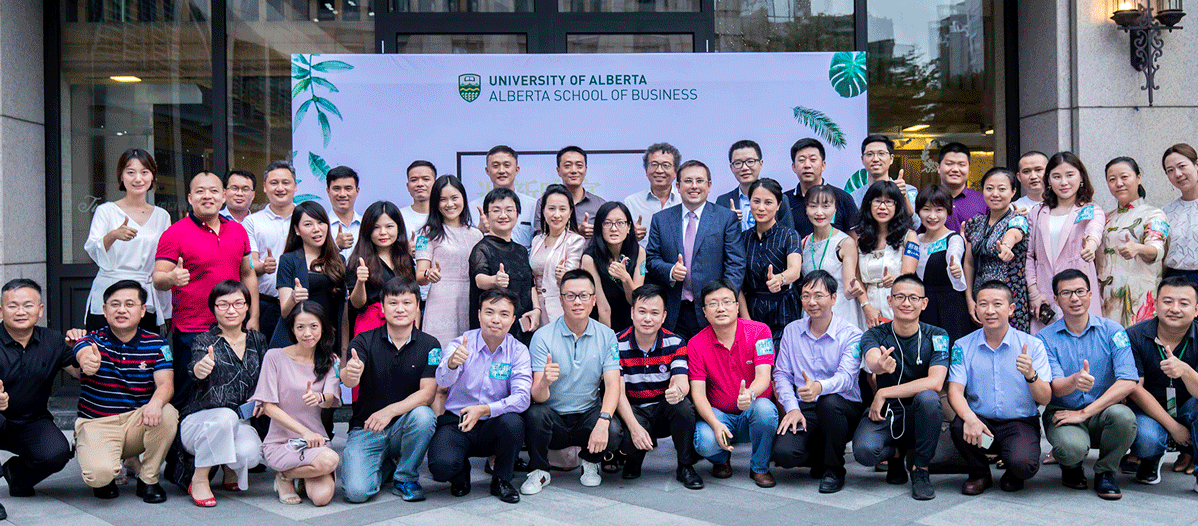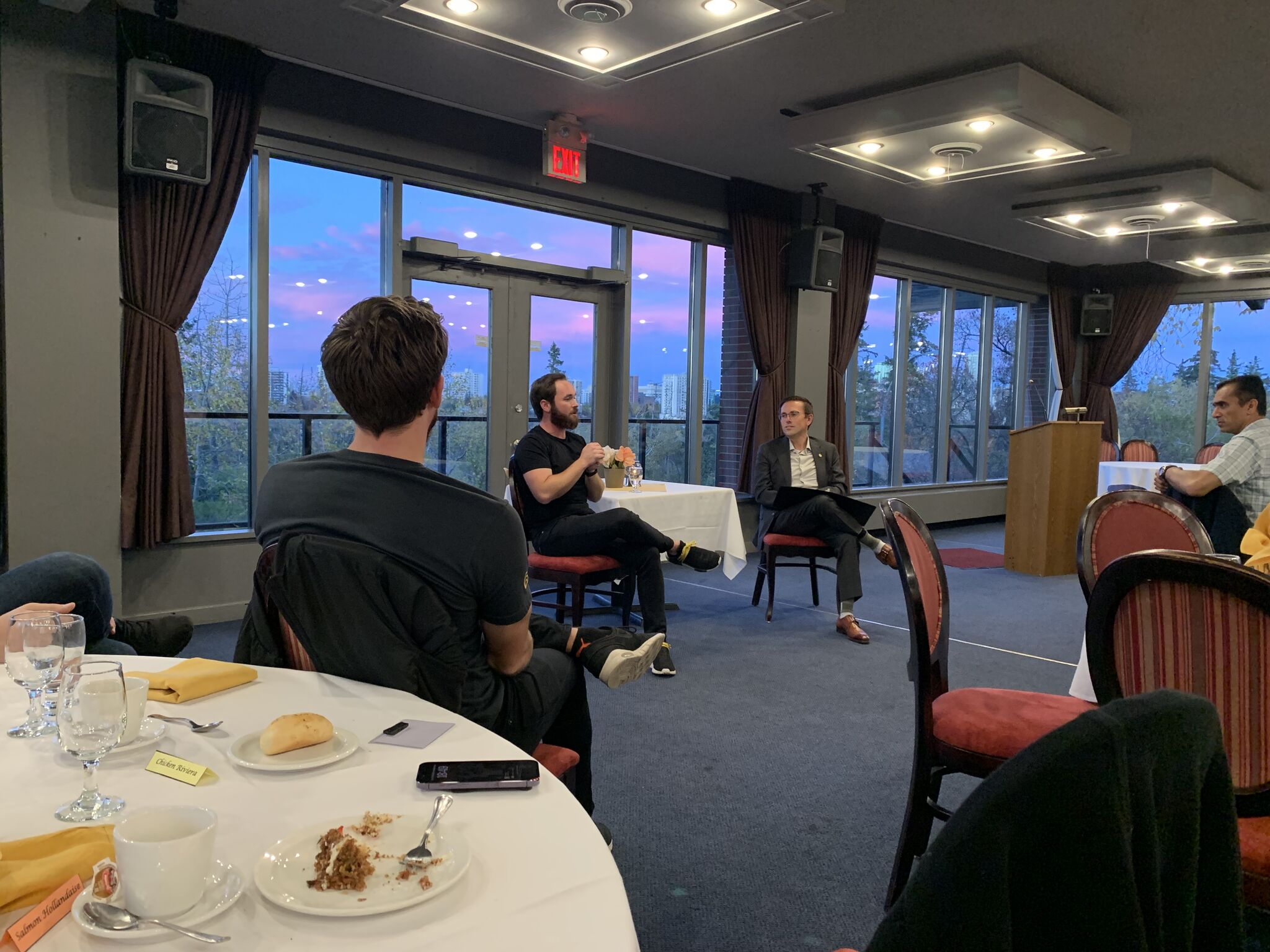
In the contemporary business world, MBA degree holds global significance, aiding businesses in growth and survival. However, today’s MBA differs from the past, and its evolution reflects changing industry needs. The diversity of MBA programmes extends beyond classrooms to locations, educators, and learning methods, mirroring our diverse world.
This article presents an insightful conversation with Dean Vikas Mehrotra, who holds the positions of Stanley A. Milner Professor and Dean at the Alberta School of Business. With a wealth of experience spanning over 30 years in academia, Dr. Mehrotra has been an integral part of the University of Alberta community since 1992. Throughout his tenure, he has assumed several key leadership positions. Notably, he served as the Associate Dean of MBA programmes from 2002 to 2005, during which he played a crucial role in launching the Masters in Financial Management programme in Shenzhen, China, as well as introducing degree offerings in Fort McMurray. Additionally, from 2007 to 2017, he held the position of Chair of the Department of Finance. It was during this time that he played a pivotal role in the establishment of the Alberta Finance Institute, aimed at promoting financial education and research to drive the economic growth of the province.
Dr. Mehrotra places a strong emphasis on the significance of data analytics and artificial intelligence within the realm of finance. He envisions these technologies playing a central role in enhancing efficiency and decision-making within the industry. He is a proponent of education that equips upcoming finance professionals with the skills to harness these technologies effectively. Through his insights, he sheds light on the challenges and opportunities that lie ahead in the field of finance.
Q1. Having attained a B.Tech in Chemical Engineering from IIT Kharagpur, you took an unconventional path by opting for an MBA instead of an MS. Could you elaborate on why you considered this path for your career?
Ans: During my time, it was a common trend for IIT graduates to head directly into MBA programmes. Most people opted for CAT exams as the usual route. However, I took a different path and accepted an offer from a small liberal arts college in Florida, which was quite exhilarating. You might wonder why I pursued an MBA without prior work experience, especially considering current norms. Back then, it was the standard approach. In today’s generation, the landscape has shifted, with most MBA programs requiring minimum work experience for admissions.
During my time at IIT, I developed a strong interest in economics and delved into various management journals, where my engineering background proved to be an asset in comprehending the mathematical foundations of financial economics, where the ability to analyse data and problem-solving are crucial. Specialising in a specific field magnifies the value of acquired skills, akin to having a set of useful purposeful tools. Suddenly, all the knowledge accumulated over the years started falling into place. The various skills I had acquired became more targeted and precise, akin to arrows finding their mark.
Q2. Could you share your journey of getting into academia? How did teaching happen for you?
Ans: My interest in academia occurred a bit later, during my MBA pursuit. Among all the classes I was taking, it was the finance and financial economics classes that truly captivated me. They delved deeply into subjects like mergers and acquisitions and capital structure, granting me valuable insights into the broader realm of corporate finance. Conversations with professors guided me towards considering a graduate degree. Instead of rushing into the private sector, I applied to a handful of universities, focusing on institutions with notable representation in top-tier academic journals. Eventually, I found my way to the University of Oregon, well-known for its expertise in corporate finance.
This journey was unexpected, as I hadn’t initially embarked on my MBA with the intention of entering academia. My initial assumption was that blending engineering and an MBA would naturally lead me to a career in the private sector. However, the additional courses I took gradually steered me towards the path of academia.

Q3: Starting as a finance professor, you have risen to become the Dean of the Alberta School of Business in April 2023. What does it take to achieve such a progression?
Ans: I’ve been with U of A for quite some time—a little over 30 years. This is quite unusual, especially in academia, where people tend to change universities more often. A couple of factors explain why I’ve stayed so long. First, I genuinely enjoy the city. Edmonton, where I reside, might not be as glamorous as Paris, but it possesses its own charm that grows on you over time.
Another significant reason is my colleagues. I’ve established robust research partnerships with them, which is pivotal in our field, where “publish or perish” is the mantra. I did spend some time at other institutions, such as a year at the Institute for Economic Research at Hitotsubashi University in Tokyo and teaching in the MBA programme at the University of North Carolina in Chapel Hill. Nevertheless, I’ve always been drawn back to the University of Alberta. Additionally, my wife teaches Japanese at the University, which further contributes to my decision to stay.
The University of Alberta places a high value on research and has earned global recognition. Unless a compelling reason arises, I haven’t felt the need to explore opportunities elsewhere.
Q4: Drawing from your substantial experience in academia and leadership at Alberta, what guidance would you offer to those eager to embark on an academic career, particularly concerning the idea of cross-pollination within academia?
Ans: Kindly consider that this is my perspective, so take it with a pinch of caution. From where I stand, the most pivotal aspect in determining your career path is assessing whether your contributions are valued and if the right infrastructure supports avenues for success. If these elements are in place, resist the urge to hastily shift elsewhere. Frequent changes often come with initial costs of time lags and potential setbacks.
However, I’m not suggesting that you refrain from making changes; sometimes, it’s the right choice. Personally, I’ve augmented my career at the U of A with visiting stints at international universities. It is beneficial to explore diverse experiences, like spending time at different universities, to break out of local academic bubbles. For instance, some of my most impactful research ideas emerged during my year at the Institute for Economic Research in Tokyo. Immersing myself in a different environment led me to insights like the distinctive adult adoption practices in Japan, where adult males are adopted for business succession purposes. We believe this cultural facet has contributed to the enduring success and longevity of many Japanese companies.
These ideas surfaced through complete immersion, necessitating overcoming language barriers and data complexities. Nevertheless, the results were highly rewarding, leading to publications in reputable journals and even coverage in media outlets like the Wall Street Journal and podcasts such as Freakanomics. Embracing the concept of cross-pollination is a strong recommendation for academics.

Q5: During your time as a researcher at the Institute of Economics in Tokyo, you encountered cultural disparities that provided profound insights. How did you navigate these distinctions?
Ans: Our research involved gathering historical data from all companies listed on Japanese stock exchanges spanning the period from 1949, when the Japanese stock exchanges re-opened after the war, to 2010. An intriguing observation emerged: in numerous instances, the successor’s surname didn’t match that of the founder. This puzzled us, given that none of our research team members were Japanese. To shed light on this, we consulted Japanese professors, who informed us that adopting adults into families is a prevalent practice in Japan. This was a novel insight for Western academics. Subsequently, we turned to almanac data from the Innovation Centre at Hitotsubashi University, one of Japan’s top universities. This dataset encompasses the genealogical histories of listed firms. Although acquiring this data was time-consuming, the effort was certainly worthwhile. Our findings demonstrated that adult adoption significantly influences corporate succession in Japan. It’s important to note that we didn’t directly interview any CEOs; all our data originated from archival sources and underwent analysis using statistical software.
Also Read: Dean Interview: Cornell’s Vishal Gaur Unveils the Dynamic Future of Business Education in 2023
Q6: While serving as the Associate Dean in China, you played a pivotal role in introducing the Masters in Financial Management programme in Shenzhen. It’s relatively uncommon for Western universities to establish themselves in China. Could you elaborate on the obstacles you encountered and the achievements you attained during this endeavour?
Ans: Absolutely, your assessment is correct; although we’re not alone, Western universities in China are indeed relatively sparse. Around 14 years ago, our objective was to launch a specialised Master’s programme in financial management with a quantitative focus on short-term securities.
Initially, we explored options in Beijing and Shanghai, but we discovered that prominent American universities already had robust programmes in those locations. This realisation prompted us to consider Shenzhen, an emerging city with immense growth potential. As a significant hub for banking and information technology, Shenzhen’s accessibility via Hong Kong made it an attractive choice.
Through a partnership with Xi’an Jiaotong University, we meticulously aligned details and navigated through the government approval processes, which extended over a span of three years. Today, the programme is a resounding success, filling us with pride for our early entry into Shenzhen – a city that holds personal significance for me, and one that I greatly enjoy visiting and meeting several of our successful alumni who have made the city their home.

Q7: After the successful launch of AU in China and Japan, which additional countries are you considering for expanding the University of Alberta?
Ans: Certainly my country of origin, India, is a very desirable destination for me, with the added advantage of having close connections with friends in higher education, some of whom have been pioneers in establishing new universities and schools in India. Currently, I’m engaged in exploratory discussions with them in a manner that aligns with our university’s goal to expand significantly into India. Our achievements in China, highlighted by a prominent programme and exceptional student outcomes, have been noteworthy. In a manner that is similar to our strong connections and alumni network in China, I’m noticing a parallel trajectory in India’s GDP per capita growth comparable to where China stood around 15 years ago. This makes India an enticing prospect, arguably one of the best ones on offer in the world at this moment in time.
The Indian middle class is expanding rapidly, yet access to higher education has struggled to keep pace. This trend is very evident, as we’ve experienced a fourfold increase in Canadian applications from India, and is likely to persist as the growing middle class seeks access to higher education opportunities. This scenario presents a chance to venture into India’s higher education landscape. While we’re exploring various ideas, our primary focus is on our B.Com programme, with a foundation in quantitative skills and business analytics. We are also fortunate that the University of Alberta is among the world’s foremost centres for the new field of artificial intelligence, with close collaboration with entities such as the Alberta Machine Intelligence Institute (AMII), renowned worldwide for its expertise in AI and machine learning.
Although there are challenges to overcome, establishing a presence in India seems viable, especially considering our prior experience in setting up a successful degree program in China. Gaining insights into the preferences and career aspirations of Indian students is of paramount importance. Our B.Com programme, bolstered by a robust analytics component, appears to be a fitting choice, building upon what we already offer.
Q8. The finance sector is undergoing transformation due to emerging trends such as the integration of AI, blockchain, and technology. How will these shifts affect MBA programmes and their financial curriculum?
Ans: Noteworthy transformations are taking place in the world of finance, primarily focusing on blockchain technology. Central banks, including the Bank of Canada, the Monetary Authority of Singapore, and the Bank of Japan, have been engaged in discussions about cryptocurrencies for many years now. This proactive stance is likely intended to prevent any unforeseen developments from catching the bankers off guard. Despite the absence of physical backing, fiat currencies remain predominant. Central banks are cautious and equipped with potential solutions, even as they continue to explore cryptocurrencies. While a complete shift to crypto appears improbable, the exploration continues.
Looking at the current landscape, AI is emerging as the next defining wave of technology. In the context of MBA and finance, fintech plays a significant role in India and China due to the challenges associated with paper currency. However, this scenario is not mirrored in Western countries such as the US and Canada. Consequently, MBA graduates need to be prepared for disruption and volatility. AI-powered analytics have evolved from mere trendy electives to essential skills businesses demand. Neglecting to grasp these skills creates a considerable knowledge gap.

Q9: Businesses are progressively showing less interest in recruiting MBAs, favouring skill experts who possess strong people management abilities. What are your insights on this trend, and how is your MBA programme adjusting to accommodate these changes?
Ans: There appear to be parallels between our feedback and your situation. Employers observe a pattern where students either heavily emphasise quantitative or people skills. This concern arises because businesses prefer students who possess a balanced combination of both skill sets. In response, we have adopted a micro-credentialing approach. This trend isn’t exclusive to us; it’s prevalent across North America. Micro-credentials offer an avenue to enhance skills. For instance, a student excelling in business analytics can simultaneously pursue a certificate in leadership. This diversification holds appeal for employers. The emphasis on quantitative skills should not overshadow the significance of people management and vice versa – both are pivotal. It’s akin to juggling two balls; if handling both is challenging, the focus should shift accordingly.
Q10: Given the prevailing MBA landscape and the typical post-MBA aspirations for swift placement in high-profile roles, what advice do you have for students approaching the MBA programme?
Ans: I would start by noting that expectations revolve around comparing student perspectives on MBA programmes through global surveys and inquiries. I agree with your assessment that students tend to lean towards conventional viewpoints. But students are also adept at rapid learning – they actively consume media, books, articles or engage on platforms such as LinkedIn. They promptly grasp changes in the landscape. As educators, it remains our responsibility to underscore that programme choices are guided by content rather than simply following trends. Leading MBA programmes showcase their innovative approaches on their respective websites – this information isn’t novel; similar information is available on many universities’ websites. Hence, the onus is on students to conduct a thorough research. Rather than casting a wide net, focusing on a select few programmes allows for a more in-depth exploration of their content and aids in finding the right fit for students.
Q11. COVID-19 sped up tech adoption, moving colleges online. Some continue virtual; others return in-person for better results. What are your thoughts on this online vs offline debate?
Ans: In relation to online education, I acknowledge the criticism that it cannot entirely substitute for in-person learning for a variety of reasons. Specifically, in the case of asynchronous online learning, a significant portion of responsibility rests on the shoulders of students. Furthermore, valuable insights often arise from interactions with peers in real time and real space, simulating the same in a virtual setting is getting better with the aid of technology, but is not a perfect substitute for the former yet – traditional classroom experience, student-to-student interactions, and collaborative projects maintain their unique and meaningful characteristics.
Our courses are adapting in response to this dynamic, as exemplified by initiatives like our Impact Series – this programme enables students to directly engage with real-world challenges encountered by cities or other businesses. This hands-on curriculum is a fundamental aspect of our educational offerings, differentiating them from many online alternatives. Although the significance of online presence is not being disregarded, its integration should be deliberate and purposeful rather than solely driven by external factors such as COVID. This juncture presents us with the chance to select how best to incorporate online elements in an effective pedagogical manner that enhances the student experience.
Also Read: CAT 2023 Preparation: Toppers Tips and Study Guide by Mayukh Sur, 98.57%iler CAT’22
Q12. From your perspective, what are the primary challenges currently confronting business schools? How do you tackle these challenges, particularly in terms of facilitating student connections with prominent brands?
Ans: Placement is crucial, especially for MBA students. As an educator, your ultimate goal is a strong placement record, which is why students pursue a Business degree and save for it. The location you choose significantly impacts this outcome. Many of our MBA students, hailing from Edmonton or Calgary, prefer opportunities within the province or nearby cities like Vancouver, Toronto, or Montreal. This preference remains unchanged.
International students often wish to stay in Canada after their studies, benefiting both their own career objectives and the needs of businesses in Canada. The demand for well-trained MBA students, particularly in business analytics, is high, and Canada’s immigrant-friendly policies make her a favourable destination for students. When considering countries like the UK, the US, Singapore, and Canada for your studies, evaluate government policies that facilitate smooth placements. Collaboration among universities, businesses, and governments is essential for successful placements. In Canada, top universities, including ours, prioritise this. Fortunately, the current alignment of factors favours successful placements.
Q13. What qualities do you seek in candidates applying to Albert University?
Ans: To begin with, we are seeking a compelling drive underpinning your application, the core rationale driving your interest in the programme. This element carries immense significance. Equally essential is your GMAT/GRE score, which serves as an indicator of your preparedness level. While exam preparation can be undertaken, the score highlights your dedication to the endeavour. Thus, GMAT/GRE results serve as a reflection of your intent in addition to being a signal of your talent. Additionally, substantial work experience holds undeniable importance.
The ability to bridge theoretical knowledge with real-world business scenarios is imperative. Without this linkage, your application lacks consideration. Moreover, proficiency in English holds weight, particularly for applicants where English is not a medium of instruction. Proficiency in quantitative skills is also of consequence. Are you equipped to manage statistical concepts during your MBA’s initial year? Admissions evaluations encompass all these factors to inform when looking for applicants.

Q14. What recommendations do you have for Indian MBA students to increase their likelihood of standing out and gaining acceptance within a more competitive group of applicants?
Ans: Focusing on the local context, the Alberta economy thrives predominantly on energy and agriculture, with a good dose of tech been thrown in over the last few years. These industries have undergone tremendous transformations, particularly with substantial investments in green technology that have propelled advancements in the energy sector. Alberta stands out by accounting for three-quarters of the national investments in green technology within the energy domain. For Indian students aspiring towards a career in the energy sector, choosing to apply here offers a distinct advantage due to its alignment with the economic landscape.
Possessing a background in early-stage financing is a positive attribute, particularly in light of our affiliation with the successful creative destruction lab. This lab, run on a franchise model with the University of Toronto and now overseen by the University of Calgary, opens up promising opportunities. Furthermore, experience gained in incubators holds significance in the eyes of our admissions committee.
Our programmes are equally tailored to cater to those enthusiastic about high-tech agriculture. We take pride in hosting a globally acclaimed AI centre that ranks among the top-tier institutions worldwide.
Q15. In your capacity as the recently appointed Dean of Alberta University, what strategies do you intend to implement in the upcoming year to elevate and refine the institution’s approach?
Ans: A key strategic endeavour in our agenda involves a comprehensive curriculum overhaul, focusing on the integration of advanced data analytics and AI. This undertaking necessitates a collaborative effort, as we are collaborating closely with the Centre for Machine Intelligence Institute, leveraging their computer science expertise alongside our team’s subject matter proficiency. The objective is to craft specialised courses tailored to sectors such as healthcare or banking. By doing so, we aim to equip students with the analytical acumen essential for thriving in these domains.
Another pivotal strategic initiative revolves around formulating a fresh international strategy. Our intent is to pinpoint specific sectors and countries where collaborations with universities can be forged to extend our programme offerings. Our emphasis isn’t on amassing an extensive array of memorandums of understanding (MOUs) with every institution. Rather, we aspire to cultivate robust alliances with select universities, akin to our existing partnership with Xi’an Jiao Tong University in China. We are convinced that this approach optimally ensures our students’ access to exceptional educational opportunities.
These initiatives encapsulate only a portion of our ongoing efforts to enhance our programmes. We firmly believe that the integration of data analytics and internationalisation holds paramount significance, serving as indispensable components for our students’ success in the contemporary 21st-century landscape.
Discover more about the Alberta School of Business through this exciting video!
Access the full interview only on PG Youtube Channel, Subscribe Now.
Thank you, dear readers, for your incredible support and enthusiasm for this interview. We’re thrilled to have you engaged on PG, and there’s more exciting content coming your way. Be sure to stay active on our platform for more captivating reads, and don’t forget to check out our recent articles here. Happy reading!
